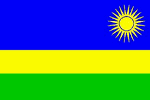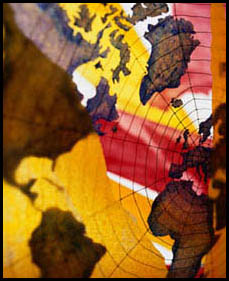|
|
Rwanda
Online Business Education. Economy. Politics. Culture. Religion. Media

Rwanda
Capital City: Kigali
Official Sites of Rwanda
The
Republic of Rwanda
President of the Republic of Rwanda
Embassy of
Rwanda
Map
Map of Rwanda
Introduction
Rwanda
Background: In 1959, three years before independence from Belgium, the
majority ethnic group, the Hutus, overthrew the ruling Tutsi king. Over
the next several years thousands of Tutsis were killed, and some 150,000
driven into exile in neighboring countries. The children of these exiles
later formed a rebel group, the Rwandan Patriotic Front and began a
civil war in 1990. The war, along with several political and economic
upheavals, exacerbated ethnic tensions culminating in April 1994 in
the genocide of roughly 800,000 Tutsis and moderate Hutus. The Tutsi
rebels defeated the Hutu regime and ended the killing in July 1994, but
approximately 2 million Hutu refugees - many fearing Tutsi retribution -
fled to neighboring Burundi, Tanzania, Uganda, and Zaire. Since then
most of the refugees have returned to Rwanda. Despite substantial
international assistance and political reforms - including Rwanda's first
local elections in March 1999 - the country continues to struggle to
boost investment and agricultural output and to foster reconciliation. A
series of massive population displacements, a nagging Hutu extremist
insurgency, and Rwandan involvement in two wars over the past four years
in the neighboring DROC continue to hinder Rwanda's efforts.
Geography Rwanda
Location: Central Africa, east of Democratic Republic of the Congo
Geographic coordinates: 2 00 S, 30 00 E
Map references: Africa
Area: total: 26,338 sq km water: 1,390 sq km land: 24,948 sq km
Area - comparative: slightly smaller than Maryland
Land boundaries: total: 893 km border countries: Burundi 290 km,
Democratic Republic of the Congo 217 km, Tanzania 217 km, Uganda 169 km
Coastline: 0 km (landlocked)
Maritime claims: none (landlocked)
Climate: temperate; two rainy seasons (February to April, November to
January); mild in mountains with frost and snow possible
Terrain: mostly grassy uplands and hills; relief is mountainous with
altitude declining from west to east
Elevation extremes: lowest point: Rusizi River 950 m highest point:
Volcan Karisimbi 4,519 m
Natural resources: gold, cassiterite (tin ore), wolframite (tungsten
ore), methane, hydropower, arable land
Land use: arable land: 32% permanent crops: 10% other: 58% (1998 est.)
Irrigated land: 40 sq km (1998 est.)
Natural hazards: periodic droughts; the volcanic Virunga mountains are
in the northwest along the border with Democratic Republic of the Congo
Environment - current issues: deforestation results from uncontrolled
cutting of trees for fuel; overgrazing; soil exhaustion; soil erosion;
widespread poaching
Environment - international agreements: party to: Biodiversity, Climate
Change, Desertification, Endangered Species, Nuclear Test Ban, Ozone
Layer Protection signed, but not ratified: Law of the Sea
Geography - note: landlocked; most of the country is savanna grassland
with the population predominantly rural
People Rwanda
Population: 7,398,074 note: estimates for this country explicitly take
into account the effects of excess mortality due to AIDS; this can result
in lower life expectancy, higher infant mortality and death rates, lower
population and growth rates, and changes in the distribution of population
by age and sex than would otherwise be expected (July 2002 est.)
Age structure: 0-14 years: 41.7% (male 1,550,141; female 1,539,375)
15-64 years: 55.4% (male 2,039,573; female 2,057,059) 65 years and over:
2.9% (male 84,030; female 127,896) (2002 est.)
Population growth rate: 1.16% (2002 est.)
Birth rate: 33.28 births/1,000 population (2002 est.)
Death rate: 21.39 deaths/1,000 population (2002 est.)
Net migration rate: -0.32 migrant(s)/1,000 population (2002 est.)
Sex ratio: at birth: 1.03 male(s)/female under 15 years: 1.01
male(s)/female 15-64 years: 0.99 male(s)/female 65 years and over:
0.66 male(s)/female total population: 0.99 male(s)/female (2002 est.)
Infant mortality rate: 117.79 deaths/1,000 live births (2002 est.)
Life expectancy at birth: 39.2 years (2002 est.) male: Total fertility
rate: 4.72 children born/woman (2002 est.)
HIV/AIDS - adult prevalence rate: 11.21% (1999 est.)
HIV/AIDS - people living with HIV/AIDS: 400,000 (1999 est.)
HIV/AIDS - deaths: 40,000 (1999 est.)
Nationality: noun: Rwandan(s) adjective: Rwandan
Ethnic groups: Hutu 84%, Tutsi 15%, Twa (Pygmoid) 1%
Religions: Roman Catholic 56.5%, Protestant 26%, Adventist 11.1%,
Muslim 4.6%, indigenous beliefs 0.1%, none 1.7% (2001)
Languages: Kinyarwanda (official) universal Bantu vernacular, French
(official), English (official), Kiswahili (Swahili) used in commercial
centers
Literacy: definition: age 15 and over can read and write total
population: 48% male: 52% female: 45% (1995 est.)
Government Rwanda
Country name: Rwandese Republic conventional short form: y'u Rwanda
Government type: republic; presidential, multiparty system
Capital: Kigali
Administrative divisions: 12 prefectures (in French - prefectures,
singular - prefecture; in Kinyarwanda - plural - NA, singular -
prefegitura); Butare, Byumba, Cyangugu, Gikongoro, Gisenyi, Gitarama,
Kibungo, Kibuye, Kigali Rurale, Kigali-ville, Umutara, Ruhengeri
Independence: 1 July 1962 (from Belgium-administered UN trusteeship)
National holiday: Independence Day, 1 July (1962)
Constitution: on 5 May 1995, the Transitional National Assembly
adopted as Fundamental Law the constitution of 18 June 1991, provisions
of the 1993 Arusha peace accord, the July 1994 Declaration by the
Rwanda Patriotic Front, and the November 1994 multiparty protocol of
understanding
Legal system: based on German and Belgian civil law systems and customary
law; judicial review of legislative acts in the Supreme Court; has not
accepted compulsory ICJ jurisdiction
Suffrage: 18 years of age; universal adult
Executive branch: chief of state: President Maj. Gen. Paul KAGAME (FPR)
(since 22 April 2000) head of government: Prime Minister Bernard MAKUZA
(since 8 March
Council of Ministers appointed by the president elections: special
election for new president by deputies of the National Assembly
and governmental ministers held 17 April 2000 (next national election
to be held NA 2003); prime minister is appointed by the president
election results: Paul KAGAME (FPR) elected president in a special
parliamentary/ministerial ballot receiving 81 of a possible 86 votes
Legislative branch: unicameral Transitional National Assembly or
Assemblee Nationale de Transition (a power-sharing body with 70 seats
established on 12 December 1994 following a multiparty protocol of
understanding; members were named by their parties, number of seats per
party predetermined by the Arusha peace accord) note: four additional
seats, two for women and two for youth, added in 2001 election results:
seats by party under the Arusha peace accord - FPR 13, MDR 13, PSD 13,
PL 13, PDC 6, RPA 6, PSR 2, PDI 2, UDPR 2; note - the distribution of
seats was predetermined, four additional seats (two for women and two for
youth) added in 2001 elections: the last national legislative elections
were held 16 December 1988 for the National Development Council (the
legislature prior to the advent of the Transitional National Assembly);
no elections have been held for the Transitional National Assembly as
the distribution of seats was predetermined by the Arusha peace accord
Judicial branch: Supreme Court; communal courts; appeals courts
Political parties and leaders: Centrist Democratic Party or PDC
[Jean-Nipomuscene NAYINZIRA]; Democratic Socialist Party or PSD [leader
NA]; Democratic Popular Union of Rwanda or UDPR [leader NA]; Democratic
Republican Movement or MDR [Celestin KABANDA]; Islamic Democratic Party or
PDI [Andre BUMAYA]; Liberal Party or PL [Pie MUGABO]; Party for Democratic
Renewal (officially banned) [Pasteur BIZIMURGI and Charilg NTAKIROTINKA];
Rwanda Patriotic Army or RPA [Maj. Gen. Paul KAGAME, commander]; Rwanda
Patriotic Front or FPR [Maj. Gen. Paul KAGAME]; Rwandan Socialist Party
or PSR [leader NA]
Political pressure groups and leaders: IBUKA - association of genocide
survivors
International organization participation: ACCT, ACP, AfDB, CCC, CEEAC,
CEPGL, ECA, FAO, G-77, IBRD, ICAO, ICFTU, ICRM, IDA, IFAD, IFC, IFRCS,
ILO, IMF, Interpol, IOC, IOM (observer), ISO (correspondent), ITU, NAM,
OAU, OPCW (signatory), UN, UNCTAD, UNESCO, UNIDO, UPU, WCL, WHO, WIPO,
WMO, WToO, WTrO
Diplomatic representation in the US: chief of mission: Ambassador Richard
SEZIBERA chancery: 1714 New Hampshire Ave. NW, Washington, DC 20009 FAX:
[1] (202) 232-4544 telephone: [1] (202) 232-2882
Diplomatic representation from the US: chief of mission: Ambassador
Margaret K. McMILLION since 13 December
#337 Boulevard de la Revolution, Kigali mailing address:
Flag description: three horizontal bands of sky blue (top, double width),
yellow, and green, with a golden sun with 24 rays near the fly end of
the blue band
Economy Rwanda
Economy - overview: Rwanda is a rural country with about 90% of
the population engaged in (mainly subsistence) agriculture. It is
the most densely populated country in Africa; landlocked with few
natural resources and minimal industry. Primary exports are coffee
and tea. The 1994 genocide decimated Rwanda's fragile economic base,
severely impoverished the population, particularly women, and eroded the
country's ability to attract private and external investment. However,
Rwanda has made significant progress in stabilizing and rehabilitating
its economy. GDP has rebounded, and inflation has been curbed. Rwanda
received approval for debt relief from the IMF in late 2000 and continued
to make progress on inflation, privatization, and GDP growth in 2001.
However, export earnings were hindered by low global coffee prices,
depriving the country of much needed hard currency. President KAGAME
is encouraging investors to take advantage of export opportunities in
Rwanda based on its membership in the COMESA free trade area and its
access to the US and the EU markets through preferential trade agreements.
GDP: purchasing power parity - $7.2 billion (2001 est.)
GDP - real growth rate: 5% (2001 est.)
GDP - per capita: purchasing power parity - $1,000 (2001 est.)
GDP - composition by sector: agriculture: 46% industry: 20% services:
34% (2000 est.)
Population below poverty line: 70% (2000 est.)
Household income or consumption by percentage share: lowest 10%: 4.2%
highest 10%: 24.2% (1983-85)
Distribution of family income - Gini index: 28.9 (1983-85)
Inflation rate (consumer prices): 5% (2001 est.)
Labor force: 3.6 million
Labor force - by occupation: agriculture 90%
Unemployment rate: NA%
Budget: revenues: $199.3 million expenditures: $445 million, including
capital expenditures of $NA (2001 est.)
Industries: cement, agricultural products, small-scale beverages, soap,
furniture, shoes, plastic goods, textiles, cigarettes
Industrial production growth rate: 7% (2001 est.)
Electricity - production: 113 million kWh (2000)
Electricity - production by source: fossil fuel: 2.65% hydro: 97.35%
other: 0% (2000) nuclear: 0%
Electricity - consumption: 174.09 million kWh (2000)
Electricity - exports: 1 million kWh (2000)
Electricity - imports: 70 million kWh (2000)
Agriculture - products: coffee, tea, pyrethrum (insecticide made from
chrysanthemums), bananas, beans, sorghum, potatoes; livestock
Exports: $61 million (f.o.b., 2001 est.)
Exports - commodities: coffee, tea, hides, tin ore
Exports - partners: EU 56.9%, Pakistan 12.3%, US 9.2%, China 4.4%
Malaysia 4.4% (2000 est.)
Imports: $248 million (f.o.b., 2001 est.)
Imports - commodities: foodstuffs, machinery and equipment, steel,
petroleum products, cement and construction material
Imports - partners: Kenya 29.4%, EU 28%, US 10%, India 4.4%, Tanzania
2.2% (2000 est.)
Debt - external: $1.3 billion (2000 est.)
Economic aid - recipient: $372.9 million (1999)
Currency: Rwandan franc (RWF)
Currency code: RWF
Exchange rates: Rwandan francs per US dollar - 456.81 (January 2002),
442.99 (2001), 389.70 (2000), 333.94 (1999) 312.31 (1998), 301.53 (1997)
Fiscal year: calendar year
Communications Rwanda
Telephones - main lines in use: 11,000 (1999)
Telephones - mobile cellular: 11,000 (1999) note: Rwanda has mobile
cellular service between Kigali and several prefecture capitals (2002)
Telephone system: general assessment: telephone system primarily serves
business and government domestic: the capital, Kigali, is connected to
the centers of the prefectures by microwave radio relay and, recently,
by cellular telephone service; much of the network depends on wire and HF
radiotelephone international: international connections employ microwave
radio relay to neighboring countries and satellite communications to more
distant countries; satellite earth stations - 1 Intelsat (Indian Ocean)
in Kigali (includes telex and telefax service)
Radio broadcast stations: AM 0, FM 3 (two main FM programs are broadcast
through a system of repeaters and the third FM program is a 24 hour BBC
program), shortwave 1 (2002)
Radios: 601,000 (1997)
Television broadcast stations: NA
Televisions: NA; probably less than 1,000 (1997)
Internet country code: .rw
Internet Service Providers (ISPs): 1 (2000)
Internet users: 5,000 (2001)
Transportation Rwanda
Railways: 0 km
Highways: total: 12,000 km paved: 1,000 km unpaved: 11,000 km (1997 est.)
Waterways: note: Lac Kivu navigable by shallow-draft barges and native
craft
Ports and harbors: Cyangugu, Gisenyi, Kibuye
Airports: 8 (2001)
Airports - with paved runways: total: 4 over 3,047 m: 1 914 to 1,523 m:
2 under 914 m: 1 (2001)
Airports - with unpaved runways: total: 4 914 to 1,523 m: 1 under 914 m:
3 (2001)
Military Rwanda
Military branches: Army, Navy, Air Force, Gendarmerie
Military manpower - availability: males age 15-49: 1,858,443 (2002 est.)
Military manpower - fit for military service: males age 15-49: 946,990
(2002 est.)
Military expenditures - dollar figure: $58 million (FY01)
Military expenditures - percent of GDP: 3.1% (FY01)
Transnational Issues Rwanda
Disputes - international: Tutsi, Hutu and other ethnic groups, political
rebels, and various government forces continue fighting in Great Lakes
region, transcending the boundaries of Burundi, Democratic Republic of
the Congo, Rwanda, and Uganda
This page was last updated on 1 January 2002
Rwanda News
Imvaho Nshya
Newsupdate
IRIN Rwanda
The Newtimes
Rwanda Information
Exchange
Yahoo! News Full Coverage-Rwanda
Business & Finance
Banque Nationale du Rwanda
Commercial Bank Of
Rwanda
Country Guide
Rwanda
About Rwanda
Tourism in Rwanda
Education
Kigali Institute of
Science, Technology and Management
National University of
Rwanda
Université Libre de
Kigali/Kigali Independent University ( ULK )
National
Museum of Rwanda
History (various sources)
Frontline: the triumph of evil
Rwanda - A Historical Chronology
History of a People
Rwanda -- History
Rwanda: How the genocide happened
Issues Rwanda
RDR
Ghosts of Rwanda
Search
Rwanda-Online
|
|
Online
Education Resources
Natural Stone Veneer
Stone Directory

Las Vegas Graphic &
Web Design
Professional
Graphic Design & Web Design in Las Vegas

Dentures.
Complete Dentures
&
Partial Dentures

Management
Training Courses in Las Vegas USA
Leadership Training & Management Courses in Las Vegas
Management
Best Practices
Management Best Practices
Management
Consulting Courses
Management Consulting Courses
Management
Training Courses
Management Training Courses
Business School
Online
Online Business Schools
Open Courseware
Free Open Courses
Online Business Courses
Business Schools Online
Business
Management Courses
Business Management Courses
CEO Magazine
CEO Magazine
CEO Library
CEO Library
CEO Club
Executive Networking
CEO Books
CEO Books
MBA Review
Review of MBA Programs
Best MBA
Ranking of World's Best MBA Programs
MBA distance
Learning
Online MBA
Top Ranking MBA
Ranking of Top MBA Programs
Online Executive
MBA
Online Executive MBA Programs
Accelerated MBA
Accelerated MBA Programs
Las Vegas Web Design
Las Vegas Web Design
|
